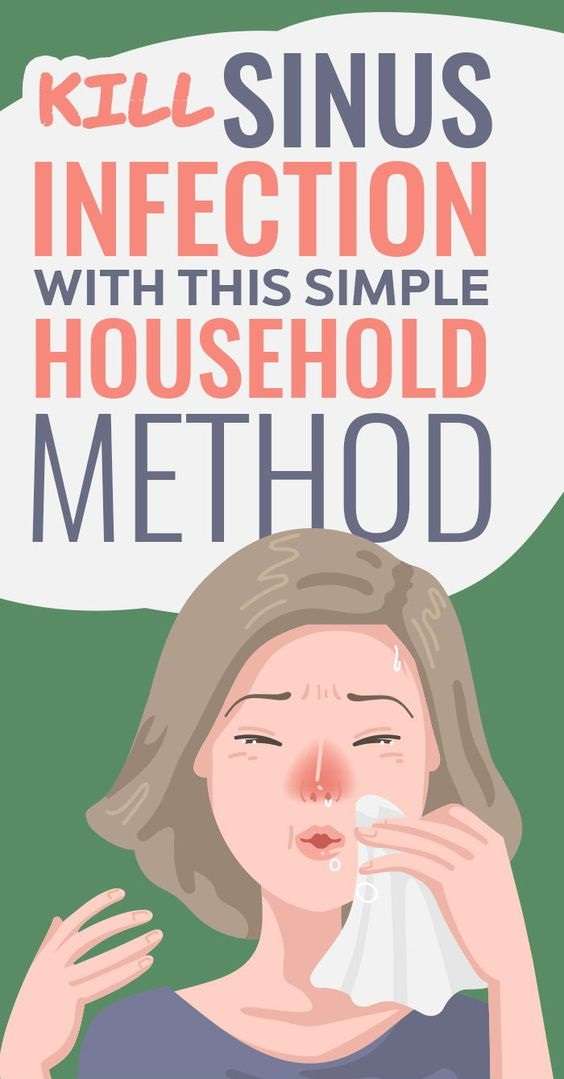Lingering Sinus Infection Or Chronic Runny Nose
A lingering sinus infection is different from a chronic runny nose. Chronic runny nose typically comes from allergies or other irritants in the air. However, this can turn into an infection over time.
When the sinuses become infected, the allergies, irritants, or viral cold have caused swelling in the nose thats blocked the drainage pathways. Consequently, fluid and mucous accumulate in the sinuses, where it has become infected with bacteria.
If youve been sick more than 10 days and begin to experience other symptoms like facial pressure, headache, and fever, youre dealing with more than a chronic runny nose.
Signs Of A Sinus Infection
A sinus infection is something you want to deal with right away to prevent it from escalating. However, its not easy to discern between the different symptoms and what they mean. After all, an infection manifests itself in a similar way to the flu or a cold, so you cant always act decisively.
With that in mind, here are some signs you have a sinus infection and should see an ear, nose and throat doctor.
Signs Of An Upper Respiratory Infection
Upper respiratory infections are common in children and adults. Some signs and symptoms include:
Sometimes an infection is also caused by:
Influenza A and B viruses
Influenza viruses are often called the stomach flu, but stomach symptoms like vomiting and diarrhea arent typical symptoms, though they are more common in babies and children than adults. True influenza viruses primarily cause upper respiratory symptoms like a sore throat and coughing, and congestion or a runny nose.
The flu viruses spread mostly by droplets when people with the flu talk, cough, or sneeze. If these droplets enter your mouth or nose, you can become infected with the flu virus.
Streptococcus bacteria
S. pyogenes is a Group A streptococcus bacteria that causes an infection in your throat and tonsils. This is often called strep throat. It usually causes sudden sore throat, painful swallowing, swollen tonsils, red spots on the roof of your mouth, swollen lymph nodes, and fever.
Headache, upper stomach pain, nausea, or vomiting are also common symptoms, especially in children.
Strep throat bacteria is spread by droplets from coughing or sneezing. If you breathe in those droplets, drink from the same glass or eat from the same plate as people who have strep throat, or touch something with droplets and then touch your mouth or nose, you may develop an infection.
- Fever
You May Like: The Best Antibiotic For Sinus Infection
Recommended Reading: What Is A Sinus Head Cold
When To Seek Medical Attention:
Children: See your doctor if your child. . .
- Develops a fever again, 7 10 days after a cold or flu like illness.
- Has yellow or green nasal discharge lasting longer than 10 days.
- Has constant facial pain
NOTE: Cold symptoms that reoccur and are associated with a clear discharge indicate a new cold, not sinusitis. A visit to the doctor is not needed follow treatment for a cold.
Adults: Adults should consult their doctor, nurse practitioner or provincial health help line if symptoms worsen or are unusually severe.
What Can You Take For A Sinus Infection While Pregnant

Instead of turning to quick fixes, it is important to learn what medications are safe. If your infection is bacterial, talk to a doctor to find out which antibiotics are safe to take during pregnancy to prevent your infection from getting worse and causing complications. Otherwise, try some of these safe and natural methods:
Read Also: Nevada Ear And Sinus Institute Reviews
Can A Sinus Infection Affect Teeth And Gums
It is possible to experience dental pain from a sinus infection. An older article in the British Dental Journal states that the maxillary sinus is the most common site for dental pain caused by a sinus infection. Pain signals are transmitted by the sinuses, teeth, and gums because they all share similar nerves.
Should I Go To Work With A Sinus Infection
Medically reviewed
All of Healthily’s articles undergo medical safety checks to verify that the information is medically safe. View more details in our safety page, or read our editorial policy.
Coronavirus
If you have a new or ongoing cough, a high temperature or you’ve noticed a change in your sense of smell or taste, you may have coronavirus . Read more about coronavirus or use our Coronavirus Risk Assessment to check your risk.
A sinus infection occurs when your sinuses become inflamed due to infection. Most sinus infections are caused by a virus, but they can be caused by bacteria.
Similar symptoms to a sinus infection can also be caused by allergies, pollutants, an infected tooth, or fungal infections.
Usually, you can only spread your illness to others if it is caused by a contagious infection.
In this article, you will learn about the symptoms and treatment of sinus infections, how contagious they are, and if you should go to work when you have one.
The following information applies to adults.
Also Check: I Think I Have Sinus Infection
Chronic Sinus Infections And Sinusitis
If you experience sinusitis and symptoms of sinus infections for 12 weeks or more, in spite of antibiotics, you may need additional treatment. Chronic sinus infections can be related to allergies, growths, or obstructions in the sinus cavities or even persistent infections. The symptoms are very similar to acute sinus infections, but often dont include a fever.
Chronic sinus infections can lead to permanent damage to your hearing and other health issues. Long term inflammation isnt good for any part of your body, and your sinus ears are no exception. The longer your sinus infection goes on, the more at risk you become.
If you have persistent sinusitis or symptoms of sinus infections, call us. We can help.
Teen Dies After Sinus Infection: How To Tell If You Have Complications
Imaging shows sinusitis of the maxillary sinus and the right meatus.
Yes, your sinuses are next to some pretty important parts of your body such as your eyes, skull, and brain. Yes, a sinus infection can occasionally spread to these areas and thus have more serious complications. And, yes, on rare occasions, these complications can be life threatening, like what reportedly happened in Michigan to a 13-year-old boy, who died after his sinus infection had apparently spread to his brain, according to Jason Duaine Hahn, writing for People.
The article in People related the tragic story of how an eighth-grader began having headaches and cold symptoms, which progressed to “migraines” and then to a swollen face with loss of muscle movement on the left side of his face and eventually to blood clots and strokes. As Hahn related, the teen eventually passed away from complications of the infection.
Indeed, this is a stark reminder of how fragile life can be and how seemingly simple health problems can quickly mushroom into much more complicated ones, even if you are young and otherwise healthy. However, this does not mean that you should freak out just because you have a sinus infection and begin popping antibiotics like they are chocolate-covered potato chips. Not only are antibiotics useless against viruses, which cause many sinus infections, but such medications can also select for antibiotic-resistant bacteria, which are much nastier and more difficult to treat.
Also Check: Advil Cold And Sinus Liquid Gels
Treatments For Sinus Infections Other Than Antibiotics
#1: Saline Nasal Wash
Saline nasal wash can be a great way to thin out the mucous in the sinuses enough to clear out the blockage. I recommend starting this early on in the course of the illness to prevent the infection from worsening.
You can even make this at home using 2 cups of water and a 1/2 teaspoon of salt. I would add a 1/2 to 1 teaspoon of baking soda to prevent burning that can occur with use. There are also plenty of over the counter saline nasal sprays that you can purchase. You can use this 4-6 times per day.
#2: Vaporizer
Vaporizers are great because they can also thin out the mucous and make you feel a lot better. An easy home remedy, steam is probably the best way to use this treatment. Beware if you are an asthmatic as the steam could cause worsening of the asthma symptoms.
#3: Steroid Nasal Spray
Steroid nasal sprays such as Flonase have been my go to remedy recently and the great news is that they are now over the counter. The general recommendation is to use 1-2 sprays per nostril daily.
But I have found great relief using 2 sprays in each nostril twice daily. At these higher doses it is important to remember that you should use this short term, no more than 5-7 days.
These medications can significantly reduce inflammation allowing the congestion blockage to clear and significantly alleviate symptoms.
#4: Decongestants
#5: Guaifenesin
Guaifenesin such as Mucinex can certainly break up the mucous, allowing the congestion to clear more quickly.
Schedule An Appointment With Independence Ear Nose & Throat
At Independence Ear, Nose & Throat, we have the expertise and experience to diagnose your symptoms and prescribe the proper ear, nose, & throat treatment to make your life easier. All you have to do is call us today at 772-888-1880, and well book you an appointment with one of our hearing health professionals.
Also Check: Ways To Ease Sinus Pain
When You Should Worry About A Sinus Infection
Most of us have suffered through a sinus infection, or sinusitis, at some point in our lives. It is no picnic, especially when they linger and nothing you try brings relief.
Sometimes sinus infections linger because you may not be treating them properly, or possibly taking the wrong medication. In rare cases, a lingering sinus infection is a sign of a more serious problem.
What Causes Sinusitis

-
Viruses: By far the most common causes of inflammation in the sinuses are viruses that cause the common cold. Viruses are notorious for causing nasal congestion , and hence, inflammation of the sinuses. These nasal symptoms can take 7-10 days to resolve on their own, and often worsen daily until reaching peak discomfort on the 4th or 5th day. The illness begins to improve gradually daily after that. With the common cold, most patients have some improvement after 7-10 days .
Also Check: Advil Cold And Sinus Relief
How To Treat A Cold
If you are dealing with a cold, there are plenty of home remedies that can help bring temporary relief to your symptoms. These include: 9
- Increasing fluid intake: staying hydrated can help soften, thin, and loosen secretions such as mucus and phlegm
- Humidified air: replenish moisture in the air to keep your sinuses from drying out and to enhance drainage of congested upper airways
- Honey: a good anti-inflammatory agent that can help soothe dry and irritated throat caused by the common cold
- Vitamin C: used as a dietary supplement to strengthen your bodys natural defense and immune system to aid recovery
Additionally, you can always look to supplement home remedies with over-the-counter medication. If you suffer from sinus pain, nasal congestion, headaches, or fever, you can trust BENYLIN® Cold & Sinus DAY/NIGHT Tablets for fast and effective relief. You can also look to BENYLIN® Extra Strength Mucus & Phlegm if you suffer from sore throat, body aches, chest congestion, and mucus and phlegm. These medications come in portable and convenient tablets, making it easy to grab, go, and use whenever you need it.
The third party trademarks used herein are trademarks of their respective owners.
Les marques de commerce des tierces parties mentionnées dans le présent site appartiennent à leurs propriétaires respectifs.
When Does A Sinus Infection Require Urgent Care
While a minor sinus infection does not require a trip to urgent care or indicate a reason for significant concern, a more severe sinus infection in which the symptoms become intolerable or last for an extended amount of time may need medical assistance for the underlying cause of the sinus infection to be appropriately treated.
During a sinus infection, it is essential to keep an eye on the symptoms and come in for a visit to our urgent care facility in the event the symptoms become intolerable or no sign of improvement is noticed after more than a week. At our urgent care facility, we can efficiently and effectively diagnose and treat the underlying cause of your sinus infection.
While prevention is the best way to handle a sinus infection, it is not always possible to prevent, especially when caused by the common cold. Therefore, it is essential to know exactly what to do if a sinus infection develops.
If you or your child develop a sinus infection that becomes concerning for any reasons, do not hesitate to come in for a visit or give us a call to find out the next step to take. There is no appointment needed, and we promise you quick and effective care here at our urgent care facility.
Questions to Ask Your Urgent Care Provider
You May Like: How To Get Rid Of Sinus Pain In Face
Ill Be Fine With Just A Nasal Spray
Nasal sprays and decongestants are short-term symptom relievers, not actual treatments. Use nasal spray between doctors appointments with a careful touch. If you rely too much on nasal spray to provide relief, your body can become dependent on it. You could get some nasty rebound congestion if and when you stop using the spray.
Should You Visit A Specialist
If your sinus infection just wont go away or keeps coming back, it may be time to see an ear, nose, and throat specialist. An ENT treats conditions of the ear, nose, throat, head, face, and neck. It may be time to see an ENT if:
- Youve completed several courses of antibiotics without success
- Your doctor suspects nasal polyps or another blockage of the nasal cavity
- You have chronic sinusitis that lasts longer than 12 weeks
Living with a sinus infection is miserable and living with a sinus infection for weeks on end is worse. Contact your doctor or an ENT to get the treatment you need.
Recommended Reading: Otc Remedies For Sinus Infection
What Can I Do To Find Relief From A Sinus Infection
- Place a warm compress over your face to help relieve pressure.
- Breathe in steam by placing a towel over your head and leaning over a bowl or sink full of hot water to allow the steam to relieve congestion. WARNING: Make sure that the water is not too hot because steam can cause burns.
- Rinse the sinuses. Dr. Takashima recommends using the squeeze bottle over the neti pot for effective nasal irrigation.
- Keep the nasal passages moist by using a saline nasal spray.
- Rest.
- Use a humidifier to add moisture to the air.
When Is A Tooth Infection An Emergency
A dental abscess infection is always considered a dental emergency. Any visible gum swelling can be life-threatening if not treated quickly.
During emergency treatment for a dental abscess, the surgeon will open up the abscess and drain it. This will relieve pressure and reduce any pain associated with the infection.
You will also receive prescription antibiotics to help clear the infection.
Read Also: How To Relieve Sinus Pressure In My Face
How Long Does A Sinus Infection Last
Sinus infections can last several days. Viral sinus infections are usually most severe three to six days after they start, and then begin to improve by day 10. A viral sinus infection can develop into a bacterial infection, which typically lasts longer than 10 days. Patients will usually respond to antibiotics within two to three days after a bacterial sinus infection is diagnosed and treated. After that, sinus infections can resolve anywhere between seven and 14 days.
There are three types of sinusitis. All three are based on length of symptoms:
Read Also: Baz Allergy Asthma And Sinus Center
Sore Throat And Hoarse Voice

Postnasal drip can leave you with a raw and aching throat. Although it may start as an annoying tickle, it can get worse.
If your infection lasts for a few weeks or more, mucus can irritate and inflame your throat as it drips, resulting in a painful sore throat and hoarse voice. Frequent coughing and throat clearing can make a hoarse voice worse.
You May Like: How Are Sinus Infections Spread
How An Ent Treats A Sinus Infection
If you have a lingering sinus infection after antibiotics, an ENT doctor often elects to be more aggressive in treatment than a primary care physician. They may prescribe longer courses of antibiotics, stronger medications, or recommend a procedure to open the sinuses.
If you have persistent sinus problems, the sinuses must first be unblocked. Sometimes, thats done through a simple balloon sinuplasty and irrigation. Other times, unblocking the sinuses requires a more aggressive procedure like endoscopic sinus surgery. We opt for this procedure when the sinuses become so blocked, tissue and bone need to be removed to create a wider opening.
If youre dealing with a lingering sinus infection, dont let it progress to a more serious issue. Call your ENT so they can discover whats at the root of your problem and find a treatment to bring you relief.
Will My Sinus Infection Clear On Its Own
If you have sinus pressure for more than a week, or have additional symptoms of infection such as fever or discolored mucus, you should make an appointment to see us. While many sinus infections clear up on their own, left untreated, they can also spread to the ear or throat. With a quick appointment well be able to determine whether you need antibiotics.
Don’t Miss: Can Ringing In Ears Be Caused By Sinus Problems